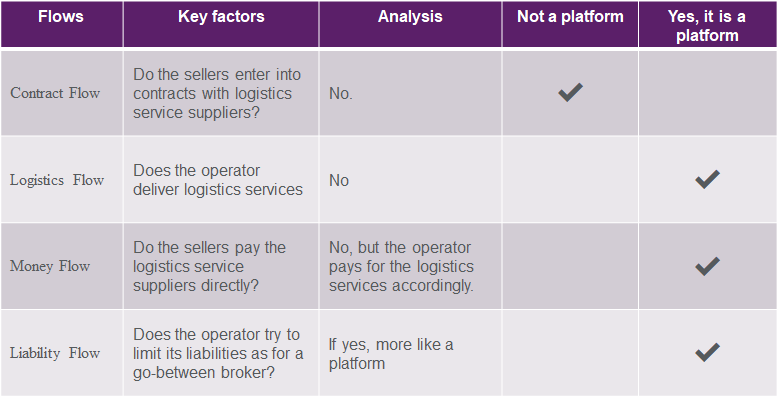On
August 31st, 2018, after five years examination and debating, the E-commerce
Law of the People's Republic of China ("E-commerce Law") was finally
published. It will come into effect on
January 1st, 2019. The E-commerce Law
defines e-commerce business operators' duties to ensure their legitimate
operation. It also clarifies the
e-commerce business operators' legal responsibilities to protect consumers' rights and personal information. It is a
heavy-duty milestone in e-commerce industry.
The
E-commerce Law distinguishes "e-commerce platform operators" (hereinafter as "Platform Operator(s)") from "e-commerce business operators using an e-commerce platform"(hereinafter "On-platform Operator(s)"). The former (i.e., Platform Operators) is just like a broker to match-make the
latter (i.e., On-platform Operators). Therefore, the "Platform Operators" is defined as "legal persons or
non-legal-person organizations who provide online business premises,
transaction matching, information dissemination services etc. for both parties
or multiple parties in e-commerce transactions, so as to facilitate both or
multiple parties in transactions to carry out transaction activities
independently". And the "On-platform
Operator" is defined as "selling goods or providing services through an
e-commerce platform".
In
addition to the Platform Opearors and the On-platform Operators, there is a third
category of e-commerce business operators which engage in sale of goods or
provision of services through their self-built proprietary websites or other
network services ("Proprietary Operators").
Among
many differences, a Platform Operator has many more compliance obligations to meet than
an On-platform Operator or Proprietary Operator (which we are going to discuss
in our subsequent serial articles). Therefore,
it is important to know, what is a Platform Operator vis-à-vis an On-platform Operator
or Proprietary Operator.
According
to the E-commerce Law, the key factors to differentiate a Platform Operator
from other operators are as follows:
(1) Does this operator provide online business
premises?
(2) Does this operator provide transaction matching
services?
(3) Does this operator provide information
dissemination services?
(4) Does this operator provide services mentioned
above to facilitate both or multiple parties in transactions for them to carry
out transaction activities independently?
For
example, Taobao, a famous Chinese online shopping website, is a Platform Operator
because it brokers both sellers and buyers on its platform, and provides them
with services like communication, product display, placing order and so on,
which fall within "providing business premises, matching the transactions and
information dissemination".
Usually,
there is no difficulty in telling a Platform Operator from others. However, sometimes, it could be a
touch-and-go. For example, a company integrates
logistics services of airliners or some other logistics service suppliers to
e-commerce sellers. That said, the
sellers do not enter into contracts with and do not make any payments to the
airliners or some other logistics service suppliers. However, wherever there is any dispute in
relation to the logistics services, it is the wish (as provided in contracts)
of integrating company that the integrating company shall not get
involved. Is the integrating company a
Platform Operator or not? We may make
analysis from contract flow, logistics flow, money flow and liability flow.

From
the contract flow, the integrating company is not like a platform because the
integrating company enters into contracts directly with sellers. However, the logistics flow shows the
integrating company matches the services of the logistics service suppliers to requirements
of the sellers. The sellers pay the
money to the platform, but the platform pays for the services of the logistics
service providers like an agent of the sellers. Because the integrating company chooses not to assume liabilities from
either sellers or the logistics service providers, the integrating company is
more like a platform trying not to get involved in any dispute. In totality, the integrating company is more
like a Platform Operator than an On-platform Operator or a Proprietary
Operator.
We
are going to write and publish on-line articles about the E-commerce Law. Please stay tuned.





